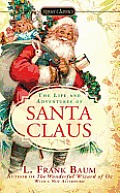Santa Claus and the Modern World of Central Heating
One of the hallmarks of L. Frank Baum’s fantasy writing was the crossover—and often conflict or rivalry—of fairy-tale traditions with modern technology. Here’s a passage from the final chapters of The Life and Adventures of Santa Claus, published in 1902.
By and by people made ships from the tree-trunks and crossed over oceans and built cities in far lands; but the oceans made little difference to the journeys of Santa Claus. His reindeer sped over the waters as swiftly as over land, and his sledge headed from east to west and followed in the wake of the sun. So that as the earth rolled slowly over Santa Claus had all of twenty-four hours to encircle it each Christmas Eve, and the speedy reindeer enjoyed these wonderful journeys more and more. . . .Fortunately, the modern world also afforded Santa a solution for this problem.
However, there was one evil following in the path of civilization that caused Santa Claus a vast amount of trouble before he discovered a way to overcome it. But, fortunately, it was the last trial he was forced to undergo.
One Christmas Eve, when his reindeer had leaped to the top of a new building, Santa Claus was surprised to find that the chimney had been built much smaller than usual. But he had no time to think about it just then, so he drew in his breath and made himself as small as possible and slid down the chimney.
”I ought to be at the bottom by this time,” he thought, as he continued to slip downward; but no fireplace of any sort met his view, and by and by he reached the very end of the chimney, which was in the cellar.
”This is odd!” he reflected, much puzzled by this experience. “If there is no fireplace, what on earth is the chimney good for?”
Then he began to climb out again, and found it hard work—the space being so small. And on his way up he noticed a thin, round pipe sticking through the side of the chimney, but could not guess what it was for.
Finally he reached the roof and said to the reindeer:
“There was no need of my going down that chimney, for I could find no fireplace through which to enter the house. I fear the children who live there must go without playthings this Christmas.”
Then he drove on, but soon came to another new house with a small chimney. This caused Santa Claus to shake his head doubtfully, but he tried the chimney, nevertheless, and found it exactly like the other. Moreover, he nearly stuck fast in the narrow flue and tore his jacket trying to get out again; so, although he came to several such chimneys that night, he did not venture to descend any more of them.
“What in the world are people thinking of, to build such useless chimneys?” he exclaimed. “In all the years I have traveled with my reindeer I have never seen the like before.”
True enough; but Santa Claus had not then discovered that stoves had been invented and were fast coming into use. When he did find it out he wondered how the builders of those houses could have so little consideration for him, when they knew very well it was his custom to climb down chimneys and enter houses by way of the fireplaces. Perhaps the men who built those houses had outgrown their own love for toys, and were indifferent whether Santa Claus called on their children or not.
“I will make all loving parents my deputies!” cried the jolly old fellow, “and they shall help me do my work. For in this way I shall save many precious minutes and few children need be neglected for lack of time to visit them.”After all, Baum had been editor of The Show Window, a trade magazine for retailers, just two years before writing this book. He had abiding faith in the power of American shopkeepers.
Besides carrying around the big packs in his swift-flying sledge old Santa began to send great heaps of toys to the toy-shops, so that if parents wanted larger supplies for their children they could easily get them; and if any children were, by chance, missed by Santa Claus on his yearly rounds, they could go to the toy-shops and get enough to make them happy and contented. For the loving friend of the little ones decided that no child, if he could help it, should long for toys in vain. And the toy-shops also proved convenient whenever a child fell ill, and needed a new toy to amuse it; and sometimes, on birthdays, the fathers and mothers go to the toy-shops and get pretty gifts for their children in honor of the happy event.



No comments:
Post a Comment